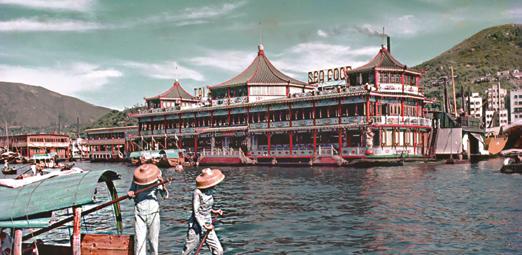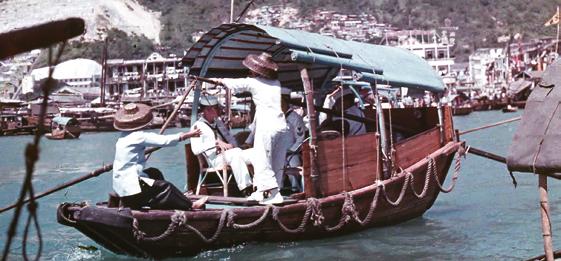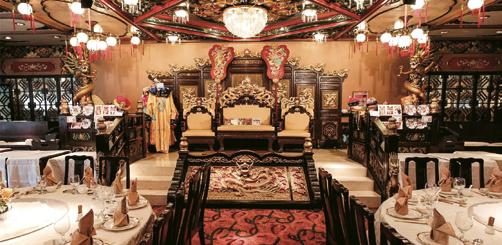
4 minute read
INTRODUCING THE MEM BERS OF THE FISHERFOLKCOMMUNITY
Echo’s grandparents are from the “water communities” (people who live on the water). When Echo was little, she used to go to Yau Ma Tei Typhoon Shelter to enjoy dragon boat racing and worship the ocean during Dragon Boat Festival every year with her grandmother. Now that she has become a dragon boat athlete, she does weekly training with her crew in Aberdeen. “I didn’t know it’s called Aberdeen at the time I was a kid. I got excited on the bus every time saw the familiar waterfront and the big sign of ‘Jumbo’ because I knew that we were about to arrive at Ocean Park!”
Despite this interesting first impression of Aberdeen, Echo had a different view of the famed Jumbo Floating Restaurant (Jumbo) growing into a young adult. “The experience of my first and only time at Jumbo was not so great — thought the restaurant was remote and old; the meal was a little over-priced. totally missed its sentimental value.” Later, Echo’s foreign friends asked her to bring them for dinner at Jumbo while visiting Hong Kong because of the introduction in a travel brochure they got at the Hong Kong airport. “I thought, ‘Aren’t there better places for seafood? I don’t think Jumbo is the right choice.’”
Advertisement
When Jumbo was towed away in 2022, Echo and her teammates happened to be there. She got caught up in the moment. “Are we witnessing the end of an era?” Echo whispered to herself, watching the fall of the largest floating restaurant in the world. She immediately thought of her foreign friends and regretted never bringing them to the iconic tourist destination. “I already missed the chance to appreciate Jumbo. I want to seize every opportunity to learn about and appreciate what we have in the neighborhood.” Recently, Echo has become more enthusiastic about community activities in the Southern District and has started to cherish the disappearing old Hong Kong culture.
“My brother pushed me into the sea because…”
Born in the 80s, Wai is from a family of fisherfolk and spent her childhood on a houseboat. Traditionally, patriarchal culture is deep-rooted in the fisherfolk community. “Luckily, my parents love my brother and me equally, unlike most fisherfolk families.” Though Wai and her big brother have a great bond, she was pushed by him into the sea when she was a child! “There is an old saying: ‘Throw the daughter into the sea.’ I didn’t know how to swim then. One day, my brother said, ‘Throw the daughter into the sea.’ And pushed me out of the boat while we were playing! He was actually trying to get me to learn swimming.”, said Wai. “There are many interesting stories like this in our ‘water communities’ because of our culture and customs.”
Wai is now a mother. While her first-born son has been learning how to swim lately, Wai shared with him this funny story of how she learned to swim as a form of passing on the fisherfolk culture. “Although it’s hard for my son to understand because he is still too young, sharing my childhood stories with him is important. He will never experience the fisherfolk's lifestyle because of the community's downfall.” Wai’s family works at the Aberdeen Wholesale Fish Market for fish transportation. She still pays close attention to the news about the fisherfolk community and is happy to share her fisherfolk knowledge with others.
“This was how we lived as a fisherfolk family decades ago.”

Shek, a middle-aged gentleman, lived with his fisherfolk family on a houseboat in Aberdeen as a child. “My mother rowed the boat ashore to send me to school. In the old days, classes finished at noon. I stood on the pier to wait for my mother to get me back on our houseboat after school.” Back then, the life of a fisherfolk was very simple. “There was no TV. We were surrounded by the sea and the sea only. We went swimming or fishing to kill time. It was quite boring.”
When fisheries were still very flourishing, Shek’s uncle owned a wood factory in Ap Lei Chau to provide wood for fishing boat manufacturing. “My uncle’s business was successful and profitable, but my father was only a fisherfolk back then.” As a fisherman who worked for other fishing business owners, Shek’s father had to leave his family for a whole month every time he went fishing. In the late 70s, catches significantly decreased. Shek’s father decided to move his family onshore to be a factory worker. “My father always warned me not to be a fisherman!” Therefore, Shek chose a career in the post office. “Who knew the mail industry would be a sunset industry years later? I guess it’s just my luck.”, said Shek with a sarcastic smile.
Kwai Hing, a marine engineer from the “water communities”, started learning more about Aberdeen because of his job there. “A vessel owner once told me there was a spirit tablet in the hold of Jumbo, in memory of more than thirty souls lost in the fire in 1971. There are many other rumors and mysteries about this boat.”, said Kwai Hing. When Jumbo’s kitchen section unexpectedly sank in 2022, Kwai Hing and his friends captured the moment on film and uploaded the videos on social media as records of the historical moment.
Regarding Jumbo being towed to Southeast Asia, “Jumbo is destined to sink. I knew it. It’s impossible to execute the towage project, knowing the complication and processes in between.” Kwai Hing feels strongly about the depressing ending of Jumbo. “If only each Hongkonger donated $100, the historic boat could definitely be preserved!” He hopes that this incident can remind people to appreciate what we already have in the city.
You can now be a part of the fisherfolk community by sharing your own story of Aberdeen!
Please share your stories with us: Fill in the form -





